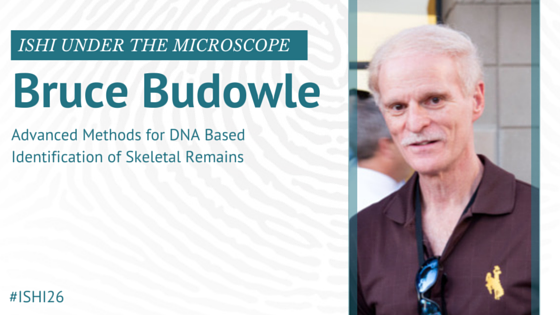The ISHI 26 agenda is already filling up with some great talks from amazing speakers! While the forensic community is a tight-knit group, we can always get a little closer, right? With that in mind, we asked our speakers some questions to get to know them a little better outside of their work. We’ll be posting their responses over the coming months in a feature we like to call Under the Microscope.
Today, we’re chatting with Dr. Bruce Budowle. Dr Budowle will be chairing the Advanced Methods for DNA Based Identification of Skeletal Remains workshop on Thursday, October 15th.
Dr. Bruce Budowle received a Ph.D. in Genetics in 1979 from Virginia Polytechnic Institute and State University. From 1979-1982, Dr. Budowle was a postdoctoral fellow at the University of Alabama at Birmingham. Working under a National Cancer Institute fellowship, he carried out research predominately on genetic risk factors for such diseases as insulin dependent diabetes mellitus, melanoma, and acute lymphocytic leukemia. From 1983-2009, Dr. Budowle was employed at the FBI Laboratory Division and carried out research, development, and validation of methods for forensic biological analyses. Dr. Budowle has worked on laying some of the foundations for the current statistical analyses in forensic biology and defining the parameters of relevant population groups. He has published more than 485 articles, made more than 550 presentations, and testified in well over 200 criminal cases in the areas of molecular biology, population genetics, statistics, quality assurance, and forensic biology. He has been a chair and member of the Scientific Working Group on DNA Methods, Chair of the DNA Commission of the ISFG, and a member of the DNA Advisory Board. He was one of the architects of the CODIS National DNA database, which maintains DNA profiles from convicted felons, from evidence in unsolved cases, and from missing persons.
Some of Dr. Budowle’s efforts over the last decade are in counter terrorism, primarily in identification of victims from mass disasters and in efforts involving microbial forensics and bioterrorism. Dr. Budowle was an advisor to New York State in the effort to identify the victims from the WTC attack. In the area of microbial forensics, Dr. Budowle has been the chair of the Scientific Working Group on Microbial Genetics and Forensics, whose mission was to set QA guidelines, develop criteria for biologic and user databases, set criteria for a National Repository, and develop forensic genomic applications. In 2009 Dr. Budowle became Executive Director of the Institute of Applied Genetics and Professor in the Department of Forensic and Investigative Genetics at the University of North Texas Health Science Center at Fort Worth, Texas. His current efforts focus on the areas of human forensic identification, microbial forensics, and emerging infectious disease.
How did you come to work in the field of forensics/DNA?
I saw an advertisement in Science for a position at the FBI. I interviewed and was hired. There was no DNA typing at the time – was part of the lucky ones who helped develop DNA typing.
If you woke up tomorrow and this field no longer existed, what would you choose for a career?
Clinical genetics
What new technologies are you most excited about or where do you see the field heading in the next 10 years?
Massively parallel sequencing is the most interesting technology. Also see the field taking on more hypothesis driven approaches.
What was the most challenging or bizarre case that you’ve worked on?
So many. But probably one of the most challenging was the early days of DNA and US v Yee where the reliability of the nascent field of DNA typing was being challenged.
What person would you say has had the biggest influence on your life?
My wife
Can you think of a specific example where ISHI has helped you in your career or with a case?
ISHI in general and Promega specifically supported a recent admissibility hearing where evidence was analyzed beyond kit requirements.
Who in the audience would benefit most from your talk?
Practitioners
If you won the lottery, what would you do with the winnings?
Fund research for graduate students
What would your ideal vacation be?
Trip to Antartica, Petra, or Tibet
WOULD YOU LIKE TO SEE MORE ARTICLES LIKE THIS? SUBSCRIBE TO THE ISHI BLOG BELOW!
SUBSCRIBE NOW!


